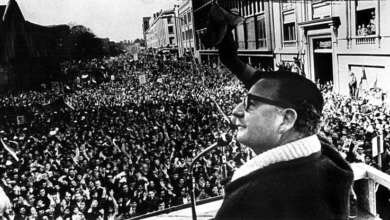A Mexican court reinstated an arrest warrant for former Mexican president Luis Echeverría on Nov. 30. Echeverría was the interior minister when he directed the 1968 police massacre of an unarmed protest by students and workers in the Plaza de Las Tres Culturas in the Tlatleco district of Mexico City.
The Oct. 2 massacre occurred just 10 days before the 1968 Summer Olympics were held in Mexico City. Official
|
The student movement had carried out nine weeks of strikes that were met with a military occupation of the Central Autonomous University of Mexico. In response 15,000 people marched through Mexico City on Oct. 2. That evening thousands gathered in the plaza for a rally. The protest was surrounded by military police armed with radios and weapons provided by the U.S. government. The police then fired live rounds at unarmed students, workers and even young children.
The massacre was part of a larger campaign of state repression aimed at the militant Mexican student and worker movements in the 1960s and 1970s.
In October 1997, the Mexican government, under pressure from the progressive movement, established a committee to investigate the massacre. During the investigation, Echeverría, who later became president and presided over another student massacre in 1971, admitted that the students were unarmed and the military action was planned in advance.
A warrant for Echeverría’s arrest was initially issued in June 2006, but was dismissed by a federal judge one month later.
Although it is a welcome development, the arrest warrant only places Echeverría under house arrest. And if he is ultimately tried and convicted, Echeverría only faces the possibility of house arrest.
Those responsible for the systematic campaign of terror against the Mexican movement, and the Mexican people, have not faced any real justice. The Mexican movement still suffers from the losses of that government campaign.
Class struggle in Mexico
The real reason for the reinstitution of the arrest warrant at this particular time is the heightened class struggle in Mexico. In particular, it is a measure intended to add a degree of legitimacy and popular appeal to the ruling National Action Party (PAN).
Former president Vicente Fox had promised to prosecute those responsible for the massacre following his 2000 presidential victory. His election ended 70 years of rule by the Institutional Revolutionary Party (PRI), the party to which Echeverría belongs. Fox’s successor, Felipe Calderón, recently stole the election from popular Democratic Revolution Party (PRD) candidate, Andrés Manuel López Obrador.
Despite the fact that Obrador, a liberal capitalist, is supported by a popular movement of millions, Calderón was stealthily sworn in at a midnight ceremony on Dec.1. The next morning a brawl between PRD and PAN lawmakers broke out before Calderón was sworn in at the congressional building. The presidential palace was protected by three-meter high metal fencing and 1,200 police for the ceremonies.
The Mexican government—representing the capitalist class—also is carrying out brutal repression against the strong, popular movement in Oaxaca. The government is threatened by the movement in the streets that continues to reveal the fallacy of Calderón’s presidency and insist on Obrador’s victory.
In the face of this, the ruling class strategy is violence and repression. As Calderón stated on Nov. 20, “My government will make use of all the force of the Mexican state, with the laws at hand and the power of the institutions. This is a war that we are going to win.”
But the growing movement in Mexico is becoming increasingly able to fend off these attacks and demand greater change. From Oaxaca to Mexico city, hundreds of thousands of workers, students and farmers are participating in progressive and revolutionary actions, signaling a crucial deepening of the class struggle.
Click here to read more from PSL about class struggle in Mexico.







